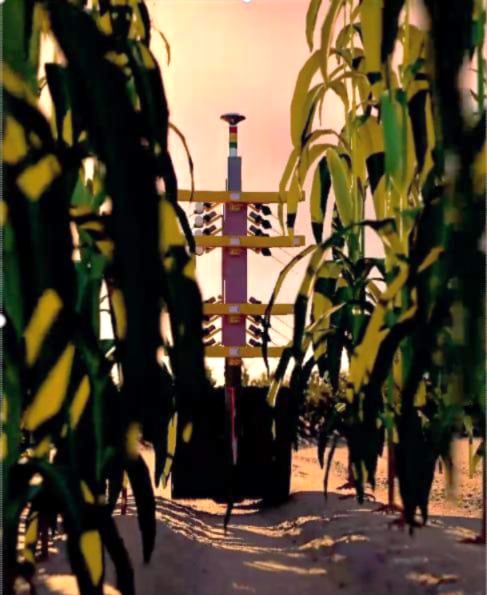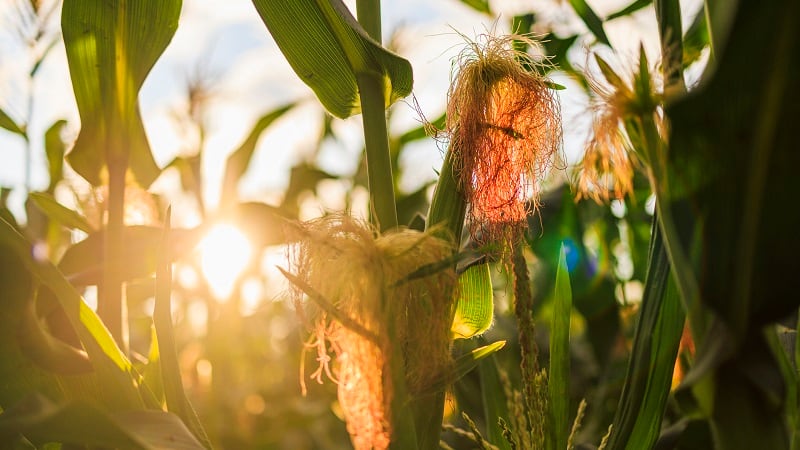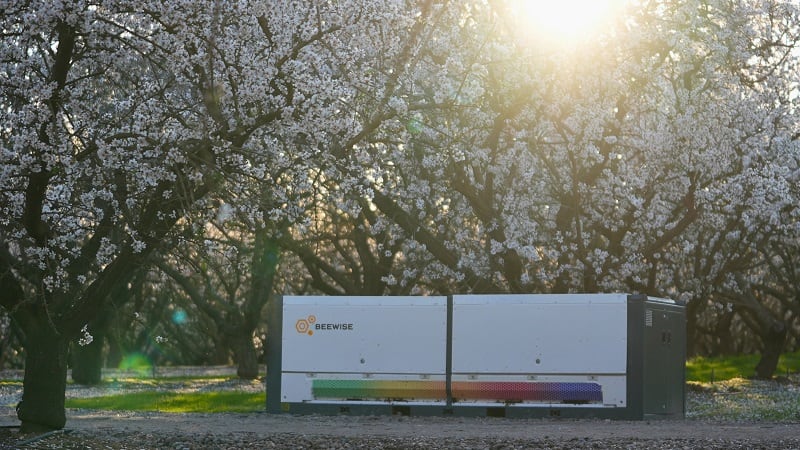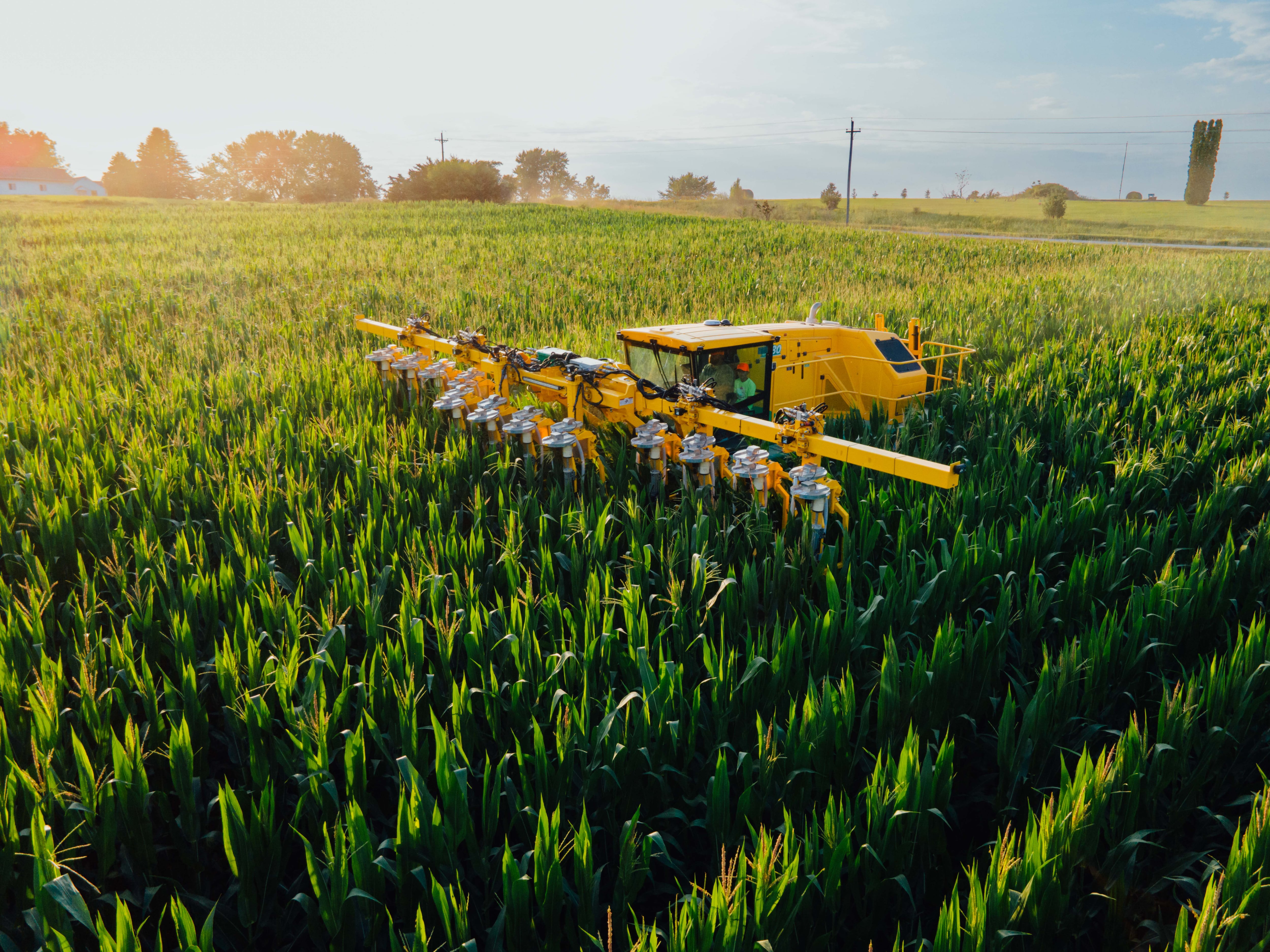Storing pollen for future use is a challenging task, but by doing so, growers can more efficiently respond to a variety of factors on the farm — from extreme weather to drought — that impact seed production, Jason Cope, co-founder and chief intellectual property officer for PowerPollen, told AgTechNavigator.
Founded in 2015 by Cope and Todd Krone, Iowa-based PowerPollen provides a patented method for storing pollen for future use, with a focus on corn, wheat, and rice crops. Preserving pollen is challenging because the substance is viable “anywhere from five minutes to an hour in the natural environment before it dies,” Cope explained.
This week, PowerPollen revealed the next evolution of its technology — an autonomous pollination robot — during a field demonstration attended by customers, government officials, growers, and investors.
The battery-powered robot is equipped with a precision sprayer to apply pollen, a GPS receiver for tracking and guidance, and machine vision that helps it navigate rows, Cope explained. The robot is designed to operate in a fleet and can be used in large fields down to farms with five acres or less, he added.
PowerPollen’s main business is the storage and application of pollen, but the robot is opening up a platform opportunity, where additional functionality can be added to the vehicles over time, Cope noted.
“You are in the field at a key reproductive time, and you have cameras, so imagine the amount of data that you can accumulate that is going to continue to inform your process,” Cope emphasized.
Precision ag for pollination problems
Growers are embracing technologies, like PowerPollen, to ensure their crops are properly pollinated, regardless of the weather, Cope said.

Corn kernels develop when silks emerge and are then fertilized by pollen, Iowa State University explained in an article. However, temperatures higher than 95° F and low relative humidity will destroy the exposed silks. Droughts can also cause plant stress that slows silk development but quickens pollen shed, producing a disconnect in the pollination cycle, the university added.
“This year, the story was rain every other day coming down in buckets. That put even more pressure on the natural system for that pollen to be able to do its work. So, for us, we have that ability to [say], ‘Oh, it is raining. No big deal. We will hold off until it is done raining.’ We will come in with our preserved pollen, and we will basically recover this field to the point where you never know anything happened from a natural environment,” Cope elaborated.
‘Venture capital money is a little allergic, if you will, right now to agtech’
Looking ahead, PowerPollen is focusing on commercialization, including securing more acres where its technology is being used and exploring market opportunities beyond its main crop of corn, Cope said. The agtech company is “active with about 85% of the market share in the corn seed space,” he added.
“We also have work going on in the background for the farmer at a grain level and within wheat and rice because there is such long felt needs for those crops to become hybrid seeds that are made cost-effective. And if you can create a cost-effective rice hybrid and wheat hybrid that you can then sell to farmers, farmers become more profitable,” Cope elaborated.
“Venture capital money is a little allergic, if you will, right now to agtech, but agtech is a foundational aspect of how we feed the world. Small companies like mine are doing things [that] are going to be felt on a world level.”
Jason Cope, co-founder and chief intellectual property officer for PowerPollen
As the company scales, PowerPollen is carefully watching the funding space for business implications, Cope acknowledged. The agtech company closed its latest round of funding with €22.5 million, led by the Liechtenstein Group.
Market research company PitchBook found that agtech deal count dropped again in the second quarter of 2025, but precision ag outpaced biologicals investments for the first time in several years, AgTechNavigator previously reported.
“We are at a time where investment for us is so important because it just continues to drive these new technologies that we are able to develop, which decreases cost of goods, but more importantly, increases reliability and output,” Cope said.
He added, “Venture capital money is a little allergic, if you will, right now to agtech, but agtech is a foundational aspect of how we feed the world. Small companies like mine are doing things [that] are going to be felt on a world level.”




